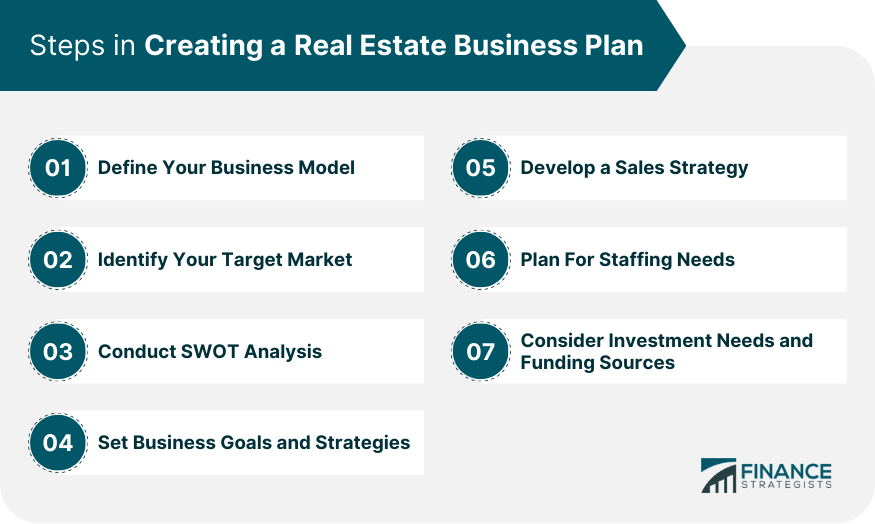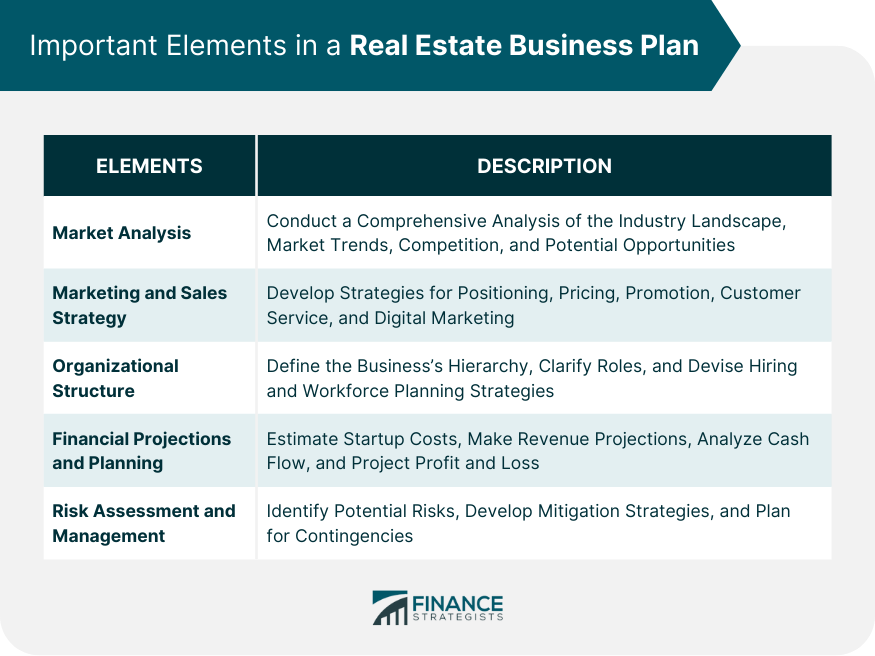The essence of a real estate business plan lies in its structure and thoroughness. It should not only cover every aspect of the business but also provide a roadmap for success. The business model outlines the company's strategy to generate revenue. For example, you could specialize in residential or commercial properties, property management, or real estate consulting. This involves determining the demographic and psychographic profile of your ideal customers. For example, are you catering to first-time homebuyers, upscale property investors, or small businesses looking for commercial spaces? Identify your business's strengths, weaknesses, opportunities, and threats. This analysis provides insights that can be used to leverage your advantages and address areas of improvement. Set SMART goals and strategies to achieve them. For example, if your goal is to increase annual revenue by 20%, your strategy might involve increasing marketing efforts or diversifying your real estate portfolio. Design a sales strategy that aligns with your business goals and market demand. It could include traditional methods, digital marketing, networking events, or open house promotions. Determine the staffing requirements of your business. Identify key roles, develop job descriptions, and plan your hiring strategy. Determine the amount of capital required to start and run the business. Consider different sources of funding, such as personal savings, bank loans, or investor financing. A comprehensive market analysis provides a deep understanding of the industry landscape, the current market trends, and the competitive environment. It should also help identify potential business opportunities. Overview of the Real Estate Industry: Present a broad overview of the industry, discussing the state of the real estate market, the economic factors influencing it, and the potential growth areas. Current Market Trends: Discuss key trends in the real estate market. For example, the shift toward remote work might be causing increased demand for homes in suburban areas. Competitor Analysis: Analyse your main competitors, examining their strengths and weaknesses, market position, business strategies, and customer perceptions. Identification of Business Opportunities: Based on your market analysis, identify potential opportunities for your business. For instance, there might be a gap in the market for affordable rental properties, which your business could aim to fill. A sound marketing and sales strategy is the backbone of any successful business. It not only attracts customers but also ensures they convert into sales. Positioning in the Market: Define your unique value proposition and how you will differentiate your business from competitors. For example, you might position your business as a luxury real estate company focusing on high-end properties. Pricing Strategy: Develop a pricing strategy that reflects your business positioning and is competitive within the market. Promotion and Advertising Strategy: Detail your promotional and advertising plans, which could include traditional advertising, digital marketing, public relations efforts, or community events. Customer Service Strategy: Outline how you plan to provide exceptional service to your customers. This could include personalized consultations, after-sale services, or a dedicated customer support team. Digital Marketing and Social Media Strategy: In the digital age, a strong online presence is crucial. Discuss your strategies for website marketing, Search Engine Optimization(SEO), social media engagement, and content marketing. The organizational structure defines the hierarchy within the business, clarifies roles and responsibilities and facilitates efficient decision-making. Business Ownership and Management: Detail the business's owners and management team, highlighting their roles, responsibilities, qualifications, and experiences that contribute to the business's success. Team Structure and Roles: Illustrate the structure of your team and the roles of each member. A well-defined team structure facilitates better coordination and efficiency within the organization. Hiring Strategy and Workforce Planning: Discuss your hiring strategy, including where and how you will recruit talent. Additionally, consider future workforce planning, detailing how you will scale your team as the business grows. Accurate financial projections and effective financial planning are critical to the viability of any business. Estimated Startup Costs: Calculate and present the estimated startup costs of the business, including real estate purchases, renovation costs, marketing expenses, operational costs, and any other significant expenditures. Revenue Projections: Provide detailed revenue projections for the business. Use industry data, market trends, and your pricing strategy to make accurate projections. Cash Flow Analysis: Develop a cash flow analysis to ensure the business will have adequate cash to cover its expenses. This analysis should cover both short-term (monthly) and long-term (annual) periods. Profit and Loss Projections: Create a profit and loss statement to protect the business's profitability. This statement should include projected revenue, cost of sales, operating expenses, and net profit. Break-Even Analysis: Conduct a break-even analysis to determine when the business will become profitable. This analysis can help you set realistic financial expectations and inform potential investors. Every business faces risks, and a real estate business is no exception. Understanding potential risks and developing strategies to manage them is crucial. Potential Risks in Real Estate Business: Identify the potential risks in the real estate industry, which might include market fluctuations, regulatory changes, property damage, or financial risks. Risk Mitigation Strategies: Propose strategies to mitigate each identified risk. For example, to mitigate financial risk, you might diversify your property portfolio or maintain a strong cash reserve. Contingency Planning: Develop contingency plans for any unforeseen circumstances. These plans provide guidelines for responding to emergencies and can help the business recover more quickly. To operate a real estate business, you must comply with various legal requirements, including licensing, registration, and adherence to fair housing laws. Consult with a legal advisor to ensure your business meets all necessary regulations. The real estate industry has a set of ethical guidelines that professionals must follow. These include treating all clients fairly, providing accurate property information, and avoiding conflicts of interest. Membership in professional bodies like the National Association of Realtors (NAR) can help you stay abreast of ethical standards in the industry. Your risk management plan outlines potential business risks and how you plan to handle them. This might include insurance coverage, financial risk management strategies, and procedures for handling disputes or complaints. This section outlines your business's strategic milestones and when you plan to achieve them. These might include hitting sales targets, expanding your team, or opening a second office. Tracking your performance using key performance indicators (KPIs) helps you assess your business's progress and effectiveness. KPIs might include the number of new clients, average sales value, or client satisfaction scores. Your leadership and management team will be instrumental in driving your business's success. Detail the experience and skills they bring to the table and how they will contribute to achieving your business objectives. Creating a robust real estate business plan involves a comprehensive approach that addresses key elements, including business model definition, target market identification, and SWOT analysis. It demands detailed market analysis, the creation of compelling marketing and sales strategies, and the establishment of a clear organizational structure. Financial planning, inclusive of estimated startup costs, revenue projections, and cash flow analysis, serves as the backbone of the plan. Equally vital is the identification of potential risks and formulation of mitigation strategies. Legal and ethical compliance, alongside a carefully designed implementation and management plan, strengthens the business framework. By considering funding needs, potential sources, and capital investment strategies, the business is better positioned for growth. Regular review and revisions ensure the business plan remains dynamic and responsive to evolving needs. With this strategic foundation, a real estate business can confidently navigate the market, fostering sustainable success.Step-By-Step Guide to Creating a Real Estate Business Plan
Define Your Business Model
Identify Your Target Market
Conduct SWOT Analysis
Set Business Goals and Strategies
Develop a Sales Strategy
Plan For Staffing Needs
Consider Investment Needs and Funding Sources

Important Elements in a Real Estate Business Plan
Market Analysis
Marketing and Sales Strategy
Organizational Structure
Financial Projections and Planning
Risk Assessment and Management

Compliance With Legal and Ethical Standards
Legal Requirements for Real Estate Businesses
Professional Ethical Guidelines
Risk Management Plan
Implementation and Management
Strategic Milestones and Timelines
Performance Measurement and KPIs
Leadership and Management Team
Final Thoughts
Creating a Real Estate Business Plan FAQs
The key elements include defining your business model, identifying your target market, conducting a SWOT analysis, setting business goals and strategies, developing a sales strategy, planning for staffing needs, and considering investment needs and funding sources. It's also important to conduct a comprehensive market analysis, devise a marketing and sales strategy, establish an organizational structure, project financials, assess risks, and have a plan for regular evaluation and revision.
Market analysis is critical because it provides an understanding of the current real estate industry, market trends, and competitive environment. This understanding helps in identifying business opportunities, making informed business decisions, and designing effective marketing and sales strategies.
Financial planning is crucial because it helps estimate startup costs, project revenue, analyze cash flow, and make profit and loss projections. Accurate financial planning ensures the business's financial viability and is critical when seeking investments or loans.
Risk assessment helps identify potential risks that could impact the business, such as market fluctuations or regulatory changes. Once risks are identified, the business can develop mitigation strategies and contingency plans, which are critical elements of a robust business plan.
You should calculate the total capital required to start and run the business, including property acquisition, renovation costs, and operational expenses. Then, identify potential sources of funding like personal savings, loans, or investor funding. Finally, discuss your strategies for investing the capital you acquire to ensure maximum returns.
True Tamplin is a published author, public speaker, CEO of UpDigital, and founder of Finance Strategists.
True is a Certified Educator in Personal Finance (CEPF®), author of The Handy Financial Ratios Guide, a member of the Society for Advancing Business Editing and Writing, contributes to his financial education site, Finance Strategists, and has spoken to various financial communities such as the CFA Institute, as well as university students like his Alma mater, Biola University, where he received a bachelor of science in business and data analytics.
To learn more about True, visit his personal website or view his author profiles on Amazon, Nasdaq and Forbes.















